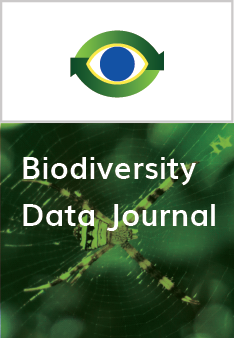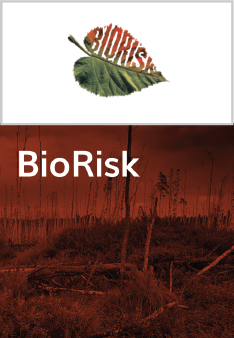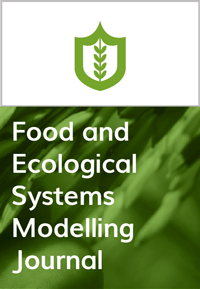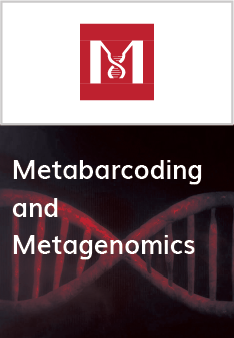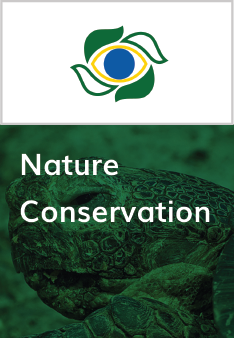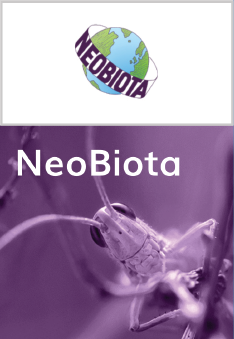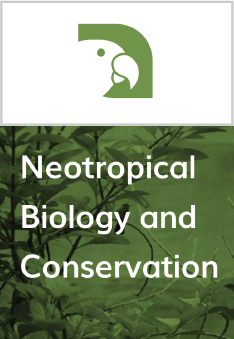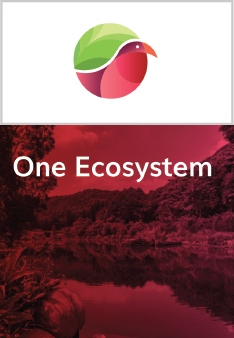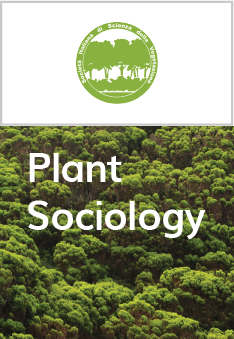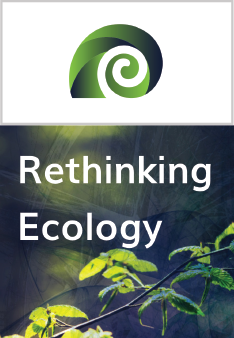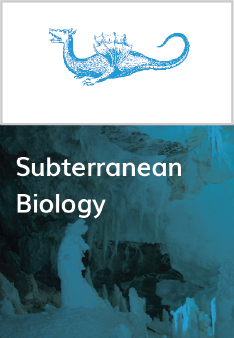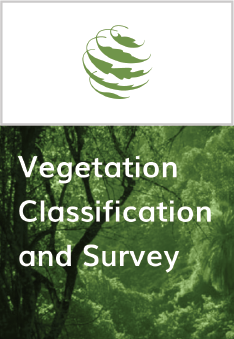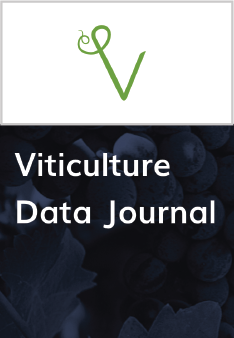Browse Journals
JOURNALS
Designed to accelerate publishing, dissemination and sharing of biodiversity data, this journal is the first to offer integrated publication of narrative and data within the article content.
Biodiversity Data Journal (BDJ) is a community peer-reviewed, open access journal, designed to accelerate publishing, dissemination and sharing of biodiversity-related data of any kind. All structural elements of the articles – text, morphological descriptions, occurrences, data tables, etc. – are treated and stored as data.
The journal publishes papers in biodiversity science containing taxonomic, floristic/faunistic, morphological, genomic, phylogenetic, ecological or environmental data on any taxon of any geological age from any part of the world. BDJ aims at integrating data and narrative in the article content to the maximum extent possible. Supplementary data files that underpin graphs, hypotheses and results should also be published with the article or deposited in trusted open access data repositories. The journal provides rich biodiversity data import and export facilities through the ARPHA Writing Tool and Darwin Core Archives.
Q3: Ecology, Evolution, Behavior and Systematics
Q2: Agricultural and Biological Sciences
Q2: Animal Science and Zoology
Q3: Insect Science
Q2: Plant Science
 , AGORA, AGRICOLA, AGRIS, Altmetric, ASCI, ASOS Indeks, Baidu Scholar, BASE, British Library, Cabell's Directory, CABI, ChronosHub, CNKI, CrossRef, Dimensions, EBSCO Essentials, EBSCOhost, eLibrary, EP Library, EZB, FreeFullPDF, GALE Academic OneFile, Genamics JournalSeek, GoOA, Google Scholar, iDiscover (University of Cambridge), Index Copernicus, IPNI, J-Gate, Journals for Free (J4F), JournalTOCs, JURN, Keepers, Lens, LetPub, Library of Congress, LIVIVO, Mendeley, MIAR, Microsoft Academic, Mir@bel, MyScienceWork, NAVER, NAVIGA, Norwegian Register, OpenAIRE, OpenAlex, OpenBiodiv, OpenBioDiv, OpenCitations, Ou-Publier?, Paperity, POL-Index, ProQuest, ProQuest Central, ProQuest Central Essentials, ProQuest Central Student, ProQuest (Natural Science Collection), ProQuest One Academic, PubAg, PubMed/MEDLINE, QOAM, ReadCube, Research4Life, ResearchBib, Research Gate, ROAD, Scibey, Science Data Bank, ScienceOpen, Scilit, Scite, SciTech Premium Collection, Semantic Scholar, Sherpa/Romeo, SIBiLS, SJR Scimago, SOLO (Search Oxford Libraries Online), Swisscovery, Transpose, Ulrichsweb™, Unpaywall, Vifabio, WanFang Data, Web of Science Researcher Profile (ex-Publons), WorldCat, X-MOL, ZDB
, AGORA, AGRICOLA, AGRIS, Altmetric, ASCI, ASOS Indeks, Baidu Scholar, BASE, British Library, Cabell's Directory, CABI, ChronosHub, CNKI, CrossRef, Dimensions, EBSCO Essentials, EBSCOhost, eLibrary, EP Library, EZB, FreeFullPDF, GALE Academic OneFile, Genamics JournalSeek, GoOA, Google Scholar, iDiscover (University of Cambridge), Index Copernicus, IPNI, J-Gate, Journals for Free (J4F), JournalTOCs, JURN, Keepers, Lens, LetPub, Library of Congress, LIVIVO, Mendeley, MIAR, Microsoft Academic, Mir@bel, MyScienceWork, NAVER, NAVIGA, Norwegian Register, OpenAIRE, OpenAlex, OpenBiodiv, OpenBioDiv, OpenCitations, Ou-Publier?, Paperity, POL-Index, ProQuest, ProQuest Central, ProQuest Central Essentials, ProQuest Central Student, ProQuest (Natural Science Collection), ProQuest One Academic, PubAg, PubMed/MEDLINE, QOAM, ReadCube, Research4Life, ResearchBib, Research Gate, ROAD, Scibey, Science Data Bank, ScienceOpen, Scilit, Scite, SciTech Premium Collection, Semantic Scholar, Sherpa/Romeo, SIBiLS, SJR Scimago, SOLO (Search Oxford Libraries Online), Swisscovery, Transpose, Ulrichsweb™, Unpaywall, Vifabio, WanFang Data, Web of Science Researcher Profile (ex-Publons), WorldCat, X-MOL, ZDBCreated to accelerate research in ecology and biodiversity, the journal covers a wide range of topics: Evolutionary Ecology, Conservation Biology, Ecosystems and others.
BioRisk is a peer-reviewed, open access, online and print, rapidly published journal in ecology and biodiversity science. The journal will consider for publication manuscripts dealing with the following topics: Species, Ecosystems & Conservation, Populations & Communities, Behavioural Ecology, Habitats, Ecosystems & Natural Spaces, Biogeography & Macroecology, Evolutionary Ecology, Conservation Biology, Ecosystem & Biodiversity Services, Biological Invasions, Biodiversity Risk Assessment, Environmental Ecology, Climate Change, Landscape Ecology, Land Use change, Marine & Freshwater Ecology, Agricultural Ecology, Urban Ecology, Restoration Ecology, and others.
Q3: Agricultural and Biological Sciences
Q3: Ecology
Q3: Animal Science and Zoology
Q3: Insect Science
Q3: Plant Science
Q3: Ecology, Evolution, Behavior and Systematics
Food and Ecological Systems Modelling Journal (FESMJ) is an innovative open access journal which facilitates the publication of mathematical models, datasets and software solutions in the areas of Agriculture, Food, Social-Ecological Interactions, Bioeconomy, Natural Resources and Environmental Sciences.
Food and Ecological Systems Modelling Journal (FESMJ) is an innovative open access journal which facilitates the publication of mathematical models, datasets and software solutions in the areas of Agriculture, Food, Social-Ecological Interactions, Bioeconomy, Natural Resources and Environmental Sciences. The journal focuses on submissions documenting the following outcomes of the research cycle: data, models, model validation studies, software, data analytics pipelines and visualisation methods.
Food and Ecological Systems Modelling Journal (FESMJ), ISSN 2815-3197 is a replacement title for and continuation of the Food Modelling Journal (FMJ), ISSN 2603-4301, published from 2019 to 2021. All content of the journal under its previous and current titles is available through the present website.
Innovative journal publishing a wide range of outcomes from across the research cycle concerning metabarcoding and metagenomics from both basic and applied aspects.
Metabarcoding and Metagenomics (MBMG) is an innovative open access online journal which publishes papers on metabarcoding and metagenomics from both basic and applied aspects. The journal welcomes submissions documenting all types of outcomes throughout the research cycle: data, models, methods, workflows, software, perspectives, opinions, and conventional research articles. The journal will consider manuscripts for publication related (but not limited) to the following topics: Environmental MBMG, Microbial MBMG, Applied MBMG (biomonitoring, quarantine, environmental assessment, nature conservation, eDNA, species invasions and others), molecular ecology, DNA-based species delimitation and identification, and other emerging fields related to MBMG. Submissions of bioinformatic approaches to MBMG (algorithms, software) are also encouraged.
The journal is published online only.
Q1: Nature and Landscape Conservation
Q2: Genetics
Q2: Molecular Biology
Q1: Ecology, Evolution, Behavior and Systematics
Q1: Insect Science
Q1: Plant Science
Research Article, Review Article, Forum Paper, Methods, Emerging Technique, Applied Study, Monitoring Schema, Data Paper, R Package, DNA barcode release, Correspondence, Primer Validation, Probe Validation, Software Description, Case Study, Editorial.
 , AGORA, Altmetric, ASCI, ASOS Indeks, Baidu Scholar, BASE, British Library, Cabell's Directory, CABI, ChronosHub, CNKI, CrossRef, Dimensions, EBSCO Essentials, EBSCOhost, eLibrary, EZB, FreeFullPDF, GALE Academic OneFile, GoOA, Google Scholar, iDiscover (University of Cambridge), Index Copernicus, J-Gate, JournalTOCs, JURN, Keepers, Lens, LetPub, Library of Congress, LIVIVO, Mendeley, MIAR, Microsoft Academic, Mir@bel, NAVER, NAVIGA, Norwegian Register, OpenAIRE, OpenAlex, OpenBioDiv, OpenCitations, Ou-Publier?, Paperity, ProQuest, ProQuest Central, ProQuest Central Essentials, ProQuest Central Student, ProQuest (Natural Science Collection), ProQuest One Academic, QOAM, ReadCube, Research4Life, ResearchBib, Research Gate, ROAD, Scibey, Science Data Bank, ScienceOpen, Scilit, Scite, SciTech Premium Collection, Semantic Scholar, Sherpa/Romeo, SIBiLS, SJR Scimago, SOLO (Search Oxford Libraries Online), Swisscovery, Transpose, Ulrichsweb™, Unpaywall, Vifabio, WanFang Data, Web of Science Researcher Profile (ex-Publons), WorldCat, ZDB
, AGORA, Altmetric, ASCI, ASOS Indeks, Baidu Scholar, BASE, British Library, Cabell's Directory, CABI, ChronosHub, CNKI, CrossRef, Dimensions, EBSCO Essentials, EBSCOhost, eLibrary, EZB, FreeFullPDF, GALE Academic OneFile, GoOA, Google Scholar, iDiscover (University of Cambridge), Index Copernicus, J-Gate, JournalTOCs, JURN, Keepers, Lens, LetPub, Library of Congress, LIVIVO, Mendeley, MIAR, Microsoft Academic, Mir@bel, NAVER, NAVIGA, Norwegian Register, OpenAIRE, OpenAlex, OpenBioDiv, OpenCitations, Ou-Publier?, Paperity, ProQuest, ProQuest Central, ProQuest Central Essentials, ProQuest Central Student, ProQuest (Natural Science Collection), ProQuest One Academic, QOAM, ReadCube, Research4Life, ResearchBib, Research Gate, ROAD, Scibey, Science Data Bank, ScienceOpen, Scilit, Scite, SciTech Premium Collection, Semantic Scholar, Sherpa/Romeo, SIBiLS, SJR Scimago, SOLO (Search Oxford Libraries Online), Swisscovery, Transpose, Ulrichsweb™, Unpaywall, Vifabio, WanFang Data, Web of Science Researcher Profile (ex-Publons), WorldCat, ZDBLaunched to cover all aspects of nature conservation, the journal publishes papers across all disciplines interested in basic and applied conservation biology and ecology.
Nature Conservation is a peer-reviewed, open access, rapidly published online journal covering all aspects of nature conservation. The journal publishes papers across all disciplines interested in basic and applied conservation ecology and nature conservation in general at various spatial, temporal and evolutionary scales, from populations to ecosystems and from microorganisms and fungi to higher plants and animals. The journal focuses on ecological, evolutionary, economic, social and other consequences of biodiversity and ecosystem management and the mitigations of negative impacts on them. Nature Conservation also strongly encourages papers on ethical, social, socio-economic, legal and policy issues related to the management and use of biodiversity and ecosystems.
Q2: Ecology, Evolution, Behavior and Systematics
Research Papers, Review Papers, Forum Papers, Data Papers, Software Descriptions, Editorials, Correspondences, Corrigenda, Monographs, Applied Ecology, Conservation in Practice, Short Communications, Letters to the Editor
 , AGORA, AGRICOLA, AGRIS, Altmetric, ASCI, ASOS Indeks, Baidu Scholar, BASE, British Library, Cabell's Directory, CABI, ChronosHub, CNKI, CNPIEC, CrossRef, Dimensions, EBSCO Essentials, EBSCOhost, eLibrary, EP Library, ERIH PLUS, EZB, FreeFullPDF, GALE Academic OneFile, Genamics JournalSeek, GoOA, Google Scholar, iDiscover (University of Cambridge), Index Copernicus, J-Gate, JournalGuide, Journals for Free (J4F), JournalTOCs, JURN, Keepers, Lens, LetPub, Library of Congress, LIVIVO, Mendeley, MIAR, Microsoft Academic, Mir@bel, NAVER, NAVIGA, Norwegian Register, OpenAIRE, OpenAlex, OpenBioDiv, OpenCitations, Ou-Publier?, Paperity, POL-Index, ProQuest, ProQuest Central, ProQuest Central Essentials, ProQuest Central Student, ProQuest (Natural Science Collection), ProQuest One Academic, PubAg, QOAM, ReadCube, Research4Life, ResearchBib, Research Gate, ROAD, Scibey, Science Data Bank, ScienceOpen, Scilit, Scite, SciTech Premium Collection, Semantic Scholar, Sherpa/Romeo, SIBiLS, SJR Scimago, SOLO (Search Oxford Libraries Online), Swisscovery, Transpose, Ulrichsweb™, Unpaywall, WanFang Data, Web of Science Researcher Profile (ex-Publons), WorldCat, X-MOL, ZDB
, AGORA, AGRICOLA, AGRIS, Altmetric, ASCI, ASOS Indeks, Baidu Scholar, BASE, British Library, Cabell's Directory, CABI, ChronosHub, CNKI, CNPIEC, CrossRef, Dimensions, EBSCO Essentials, EBSCOhost, eLibrary, EP Library, ERIH PLUS, EZB, FreeFullPDF, GALE Academic OneFile, Genamics JournalSeek, GoOA, Google Scholar, iDiscover (University of Cambridge), Index Copernicus, J-Gate, JournalGuide, Journals for Free (J4F), JournalTOCs, JURN, Keepers, Lens, LetPub, Library of Congress, LIVIVO, Mendeley, MIAR, Microsoft Academic, Mir@bel, NAVER, NAVIGA, Norwegian Register, OpenAIRE, OpenAlex, OpenBioDiv, OpenCitations, Ou-Publier?, Paperity, POL-Index, ProQuest, ProQuest Central, ProQuest Central Essentials, ProQuest Central Student, ProQuest (Natural Science Collection), ProQuest One Academic, PubAg, QOAM, ReadCube, Research4Life, ResearchBib, Research Gate, ROAD, Scibey, Science Data Bank, ScienceOpen, Scilit, Scite, SciTech Premium Collection, Semantic Scholar, Sherpa/Romeo, SIBiLS, SJR Scimago, SOLO (Search Oxford Libraries Online), Swisscovery, Transpose, Ulrichsweb™, Unpaywall, WanFang Data, Web of Science Researcher Profile (ex-Publons), WorldCat, X-MOL, ZDBPublishing across disciplines dealing with biological invasions, the journal accepts papers on the ecology, evolution and biogeography of non-indigenous aquatic and terrestrial species.
NeoBiota is a peer-reviewed, open access, online journal launched to accelerate research on alien species and biological invasions: aquatic and terrestrial, animals, plants, fungi and micro-organisms. The journal is a continuation of the former NEOBIOTA publication series. NeoBiota publishes papers across all disciplines interested in biological invasions, specifically on the ecology, evolution and biogeography of non-indigenous aquatic and terrestrial animals, plants, fungi and micro-organisms, on mechanisms that drive the introduction, establishment and spread of these species, on ecological, evolutionary, economic and other consequences of biological invasions, and on the management of invasions in any part of the world. The journal also strongly encourages papers on ethical, social, legal and policy issues related to biological invasions.
Q1: Ecology
Q1: Aquatic Science
Q1: Ecological Modeling
Q1: Ecology
Q1: Ecology, Evolution, Behavior and Systematics
Q1: Insect Science
Q1: Plant Science
 , AGORA, AGRICOLA, AGRIS, Altmetric, ASCI, ASOS Indeks, Baidu Scholar, BASE, BHL Citebank, British Library, Cabell's Directory, CABI, ChronosHub, CNKI, CNPIEC, CrossRef, Dimensions, EBSCO Essentials, EBSCOhost, eLibrary, EP Library, ERIH PLUS, EZB, FreeFullPDF, GALE Academic OneFile, Genamics JournalSeek, GoOA, Google Scholar, iDiscover (University of Cambridge), Index Copernicus, J-Gate, JournalGuide, Journals for Free (J4F), JournalTOCs, JURN, Keepers, Lens, LetPub, Library of Congress, LIVIVO, Mendeley, MIAR, Microsoft Academic, Mir@bel, MyScienceWork, NAVER, NAVIGA, Norwegian Register, OpenAIRE, OpenAlex, OpenBioDiv, OpenCitations, Ou-Publier?, Paperity, POL-Index, ProQuest, ProQuest Central, ProQuest Central Essentials, ProQuest Central Student, ProQuest (Natural Science Collection), ProQuest One Academic, PubAg, QOAM, ReadCube, Research4Life, ResearchBib, Research Gate, ROAD, Science Data Bank, ScienceOpen, Scilit, Scite, SciTech Premium Collection, Semantic Scholar, Sherpa/Romeo, SIBiLS, SJR Scimago, SOLO (Search Oxford Libraries Online), Swisscovery, Transpose, UDL-EDGE, Ulrichsweb™, Unpaywall, Vifabio, WanFang Data, Web of Science Researcher Profile (ex-Publons), WorldCat, X-MOL, ZDB
, AGORA, AGRICOLA, AGRIS, Altmetric, ASCI, ASOS Indeks, Baidu Scholar, BASE, BHL Citebank, British Library, Cabell's Directory, CABI, ChronosHub, CNKI, CNPIEC, CrossRef, Dimensions, EBSCO Essentials, EBSCOhost, eLibrary, EP Library, ERIH PLUS, EZB, FreeFullPDF, GALE Academic OneFile, Genamics JournalSeek, GoOA, Google Scholar, iDiscover (University of Cambridge), Index Copernicus, J-Gate, JournalGuide, Journals for Free (J4F), JournalTOCs, JURN, Keepers, Lens, LetPub, Library of Congress, LIVIVO, Mendeley, MIAR, Microsoft Academic, Mir@bel, MyScienceWork, NAVER, NAVIGA, Norwegian Register, OpenAIRE, OpenAlex, OpenBioDiv, OpenCitations, Ou-Publier?, Paperity, POL-Index, ProQuest, ProQuest Central, ProQuest Central Essentials, ProQuest Central Student, ProQuest (Natural Science Collection), ProQuest One Academic, PubAg, QOAM, ReadCube, Research4Life, ResearchBib, Research Gate, ROAD, Science Data Bank, ScienceOpen, Scilit, Scite, SciTech Premium Collection, Semantic Scholar, Sherpa/Romeo, SIBiLS, SJR Scimago, SOLO (Search Oxford Libraries Online), Swisscovery, Transpose, UDL-EDGE, Ulrichsweb™, Unpaywall, Vifabio, WanFang Data, Web of Science Researcher Profile (ex-Publons), WorldCat, X-MOL, ZDBNeotropical Biology and Conservation is an open-access, peer-reviewed, scientific journal. It publishes original research articles on the description, analysis and conservation of the biological diversity with emphasis on the Neotropical region.
Neotropical Biology and Conservation is an open-access, peer-reviewed, scientific journal. It welcomes research on ecology, behaviour, biogeography, evolution, and systematics of all types of Neotropical organisms, either native or introduced, and related environmental aspects. Studies that demonstrate the application of conservation principles for natural resource management and policy are most welcome. Neotropical Biology and Conservation is published four times a year.
Q4: Ecology
Q4: Zoology
Q3: Insect Science
Q3: Animal Science and Zoology
Q3: Plant Science
Q3: Ecology, Evolution, Behavior and Systematics
Research Articles, Short Communications, Commentaries, Review Articles
 , AGORA, AGRICOLA, AGRIS, Altmetric, ASCI, ASFA-FAO, ASOS Indeks, Baidu Scholar, BASE, British Library, Cabell's Directory, CABI, ChronosHub, CNKI, CrossRef, Dimensions, EBSCO Essentials, eLibrary, ERIH PLUS, EZB, FreeFullPDF, GALE Academic OneFile, GoOA, Google Scholar, iDiscover (University of Cambridge), Index Copernicus, Journals for Free (J4F), JournalTOCs, JURN, Keepers, LatIndex, Lens, LetPub, Library of Congress, LIVIVO, Mendeley, MIAR, Microsoft Academic, Mir@bel, MyScienceWork, NAVER, NAVIGA, OpenAIRE, OpenAlex, OpenBiodiv, OpenBioDiv, Paperity, POL-Index, ProQuest, ProQuest Central, ProQuest (Natural Science Collection), PubAg, QOAM, Redib, Research4Life, ResearchBib, Research Gate, ROAD, Scibey, ScienceOpen, Scilit, Scite, Semantic Scholar, Sherpa/Romeo, SIBiLS, SJR Scimago, SOLO (Search Oxford Libraries Online), Swisscovery, Transpose, Ulrichsweb™, Unpaywall, Vifabio, Web of Science Researcher Profile (ex-Publons), WorldCat, ZDB
, AGORA, AGRICOLA, AGRIS, Altmetric, ASCI, ASFA-FAO, ASOS Indeks, Baidu Scholar, BASE, British Library, Cabell's Directory, CABI, ChronosHub, CNKI, CrossRef, Dimensions, EBSCO Essentials, eLibrary, ERIH PLUS, EZB, FreeFullPDF, GALE Academic OneFile, GoOA, Google Scholar, iDiscover (University of Cambridge), Index Copernicus, Journals for Free (J4F), JournalTOCs, JURN, Keepers, LatIndex, Lens, LetPub, Library of Congress, LIVIVO, Mendeley, MIAR, Microsoft Academic, Mir@bel, MyScienceWork, NAVER, NAVIGA, OpenAIRE, OpenAlex, OpenBiodiv, OpenBioDiv, Paperity, POL-Index, ProQuest, ProQuest Central, ProQuest (Natural Science Collection), PubAg, QOAM, Redib, Research4Life, ResearchBib, Research Gate, ROAD, Scibey, ScienceOpen, Scilit, Scite, Semantic Scholar, Sherpa/Romeo, SIBiLS, SJR Scimago, SOLO (Search Oxford Libraries Online), Swisscovery, Transpose, Ulrichsweb™, Unpaywall, Vifabio, Web of Science Researcher Profile (ex-Publons), WorldCat, ZDBThe journal welcomes both traditional and unconventional research outputs, including data, models, methods and others in all aspects of ecology, environmental sciences, and cross-disciplinary areas of study.
One Ecosystem is an innovative open access scholarly journal which provides a forum for studies in the field of ecology and sustainability. In addition to conventional research papers, the journal welcomes contributions documenting the entire research cycle, including data, models, methods, workflows, results, software, perspectives and policy recommendations. By making research outputs public, the journal will open up new mechanisms for integration of information, collaboration, appraisal, and dissemination.
One Ecosystem uses ARPHA - a technologically unique publishing platform which supports the full life cycle of a manuscript, from writing through submission, public peer-review, publication and dissemination.
Q3: Environmental Sciences
Q1: Agricultural and Biological Sciences
Q2: Ecology, Evolution, Behavior and Systematics
Q2: Ecology
Q2: Nature and Landscape Conservation
 , AGORA, AGRICOLA, AGRIS, Altmetric, ASCI, ASOS Indeks, BASE, British Library, Cabell's Directory, CABI, ChronosHub, CNKI, CrossRef, Dimensions, EBSCO Essentials, EBSCOhost, eLibrary, EP Library, ERIH PLUS, EZB, FreeFullPDF, GALE Academic OneFile, Genamics JournalSeek, GoOA, Google Scholar, iDiscover (University of Cambridge), Index Copernicus, J-Gate, JournalTOCs, JURN, Keepers, Lens, LetPub, Library of Congress, LIVIVO, Mendeley, MIAR, Microsoft Academic, Mir@bel, NAVIGA, Norwegian Register, OpenAIRE, OpenAlex, OpenBioDiv, Ou-Publier?, Paperity, POL-Index, ProQuest, ProQuest Central, ProQuest Central Essentials, ProQuest Central Student, ProQuest (Natural Science Collection), ProQuest One Academic, PubAg, QOAM, Research4Life, ResearchBib, Research Gate, ROAD, Scibey, Science Data Bank, ScienceOpen, Scilit, Scite, SciTech Premium Collection, Semantic Scholar, Sherpa/Romeo, SIBiLS, SJR Scimago, SOLO (Search Oxford Libraries Online), Swisscovery, Transpose, Ulrichsweb™, Unpaywall, Vifabio, Web of Science Researcher Profile (ex-Publons), WorldCat, X-MOL, ZDB
, AGORA, AGRICOLA, AGRIS, Altmetric, ASCI, ASOS Indeks, BASE, British Library, Cabell's Directory, CABI, ChronosHub, CNKI, CrossRef, Dimensions, EBSCO Essentials, EBSCOhost, eLibrary, EP Library, ERIH PLUS, EZB, FreeFullPDF, GALE Academic OneFile, Genamics JournalSeek, GoOA, Google Scholar, iDiscover (University of Cambridge), Index Copernicus, J-Gate, JournalTOCs, JURN, Keepers, Lens, LetPub, Library of Congress, LIVIVO, Mendeley, MIAR, Microsoft Academic, Mir@bel, NAVIGA, Norwegian Register, OpenAIRE, OpenAlex, OpenBioDiv, Ou-Publier?, Paperity, POL-Index, ProQuest, ProQuest Central, ProQuest Central Essentials, ProQuest Central Student, ProQuest (Natural Science Collection), ProQuest One Academic, PubAg, QOAM, Research4Life, ResearchBib, Research Gate, ROAD, Scibey, Science Data Bank, ScienceOpen, Scilit, Scite, SciTech Premium Collection, Semantic Scholar, Sherpa/Romeo, SIBiLS, SJR Scimago, SOLO (Search Oxford Libraries Online), Swisscovery, Transpose, Ulrichsweb™, Unpaywall, Vifabio, Web of Science Researcher Profile (ex-Publons), WorldCat, X-MOL, ZDBPlant Sociology publishes research articles on all aspects of vegetation, from plant community to landscape level including dynamic processes, focusing on vegetation & Annex I habitats interpretation, classification, mapping, management, conservation and monitoring.
Plant Sociology is an international open-access, peer-reviewed journal edited by the "Società Italiana di Scienza della Vegetazione" (SISV).
It publishes original research articles dealing with all aspects of vegetation, from plant community to landscape level, including dynamic processes and community ecology. It favours papers focusing on plant sociology and vegetation survey for developing ecological models, vegetation interpretation, classification and mapping, environmental quality assessment, plant biodiversity management and conservation, EU Annex I habitats interpretation and monitoring, on the ground of rigorous and quantitative measures of physical and biological components.
The journal is open to territorial studies at different geographic scale and accepts contributes dealing with applied research, provided they offer new methodological perspectives and a robust, updated vegetation analysis.
Plant Sociology supports the Italian Vegetation Data Base VegItaly (member of the Global Index of Vegetation-Plot Databases - GIVD) and urges the contributing Authors to store their vegetation data in it.
Plant Sociology has succeeded Fitosociologia (1990-2011, ISSN 1125-9078) and Notiziario della Società Italiana di Fitosociologia (1964-1989, ISSN 1120-4605), the historical journals of the SISV. The name Plant Sociology is a tribute to the founder of Phytosociology, Josias Braun-Blanquet (1884-1980), who used it in the English translation of his major monographic work "Pflanzensoziologie".
Q2: Plant Science
Q2: Ecology
Q2: Ecology, Evolution, Behavior and Systematics
 , AGORA, AGRICOLA, AGRIS, Altmetric, ASCI, ASOS Indeks, Baidu Scholar, BASE, British Library, Cabell's Directory, CABI, ChronosHub, CNKI, CrossRef, Dimensions, EBSCO Essentials, EBSCOhost, eLibrary, ERIH PLUS, EZB, FreeFullPDF, GALE Academic OneFile, GoOA, iDiscover (University of Cambridge), Index Copernicus, JournalGuide, JURN, Keepers, Lens, LetPub, Library of Congress, LIVIVO, Mendeley, MIAR, Mir@bel, MyScienceWork, NAVER, NAVIGA, OpenAIRE, OpenAlex, OpenBioDiv, POL-Index, ProQuest Central, QOAM, Research4Life, Scibey, ScienceOpen, Scilit, Scite, Semantic Scholar, Sherpa/Romeo, SIBiLS, SJR Scimago, SOLO (Search Oxford Libraries Online), Swisscovery, Transpose, Ulrichsweb™, Unpaywall, Vifabio, Web of Science Researcher Profile (ex-Publons), WorldCat, ZDB
, AGORA, AGRICOLA, AGRIS, Altmetric, ASCI, ASOS Indeks, Baidu Scholar, BASE, British Library, Cabell's Directory, CABI, ChronosHub, CNKI, CrossRef, Dimensions, EBSCO Essentials, EBSCOhost, eLibrary, ERIH PLUS, EZB, FreeFullPDF, GALE Academic OneFile, GoOA, iDiscover (University of Cambridge), Index Copernicus, JournalGuide, JURN, Keepers, Lens, LetPub, Library of Congress, LIVIVO, Mendeley, MIAR, Mir@bel, MyScienceWork, NAVER, NAVIGA, OpenAIRE, OpenAlex, OpenBioDiv, POL-Index, ProQuest Central, QOAM, Research4Life, Scibey, ScienceOpen, Scilit, Scite, Semantic Scholar, Sherpa/Romeo, SIBiLS, SJR Scimago, SOLO (Search Oxford Libraries Online), Swisscovery, Transpose, Ulrichsweb™, Unpaywall, Vifabio, Web of Science Researcher Profile (ex-Publons), WorldCat, ZDBBack issues are available here
Rethinking Ecology is an open access journal that aims at fostering both forward thinking and the publication of novel ideas in ecology, evolution and environmental sciences
Rethinking Ecology is an open access journal that aims at fostering forward thinking and the publication of novel ideas in all areas of ecology. To achieve these aims, the journal publishes perspectives, research papers, rapid communications, responses, software descriptions and horizon scanning papers with an emphasis on new hypotheses and bold ideas. We believe that new ideas and innovative research do not arise from direct invitations and we are committed to enable all authors to publish their best work, regardless of their seniority, gender, publication track record and country of origin.
 , AGORA, AGRICOLA, AGRIS, ASCI, ASOS Indeks, Baidu Scholar, BASE, British Library, Cabell's Directory, CABI, ChronosHub, CNKI, CrossRef, Dimensions, EBSCO Essentials, EBSCOhost, EP Library, ERIH PLUS, EZB, FreeFullPDF, GALE Academic OneFile, GoOA, Google Scholar, iDiscover (University of Cambridge), Index Copernicus, J-Gate, JournalTOCs, JURN, Keepers, Lens, LetPub, Library of Congress, LIVIVO, Mendeley, MIAR, Microsoft Academic, Mir@bel, NAVER, NAVIGA, Norwegian Register, OpenAIRE, OpenAlex, OpenBioDiv, OpenCitations, Ou-Publier?, Paperity, ProQuest, ProQuest Central, ProQuest Central Essentials, ProQuest Central Student, ProQuest (Natural Science Collection), ProQuest One Academic, PubAg, QOAM, ReadCube, Research4Life, ResearchBib, ROAD, Scibey, ScienceOpen, Scilit, Scite, SciTech Premium Collection, Semantic Scholar, Sherpa/Romeo, SIBiLS, SJR Scimago, SOLO (Search Oxford Libraries Online), Swisscovery, Transpose, Ulrichsweb™, Unpaywall, WanFang Data, Web of Science Researcher Profile (ex-Publons), WorldCat, ZDB
, AGORA, AGRICOLA, AGRIS, ASCI, ASOS Indeks, Baidu Scholar, BASE, British Library, Cabell's Directory, CABI, ChronosHub, CNKI, CrossRef, Dimensions, EBSCO Essentials, EBSCOhost, EP Library, ERIH PLUS, EZB, FreeFullPDF, GALE Academic OneFile, GoOA, Google Scholar, iDiscover (University of Cambridge), Index Copernicus, J-Gate, JournalTOCs, JURN, Keepers, Lens, LetPub, Library of Congress, LIVIVO, Mendeley, MIAR, Microsoft Academic, Mir@bel, NAVER, NAVIGA, Norwegian Register, OpenAIRE, OpenAlex, OpenBioDiv, OpenCitations, Ou-Publier?, Paperity, ProQuest, ProQuest Central, ProQuest Central Essentials, ProQuest Central Student, ProQuest (Natural Science Collection), ProQuest One Academic, PubAg, QOAM, ReadCube, Research4Life, ResearchBib, ROAD, Scibey, ScienceOpen, Scilit, Scite, SciTech Premium Collection, Semantic Scholar, Sherpa/Romeo, SIBiLS, SJR Scimago, SOLO (Search Oxford Libraries Online), Swisscovery, Transpose, Ulrichsweb™, Unpaywall, WanFang Data, Web of Science Researcher Profile (ex-Publons), WorldCat, ZDBSilva Balcanica is an International Scientific Journal, publishes original results of investigations of all aspects of forest ecosystems and landscapes of Balkan Peninsula.
Silva Balcanica is an International Scientific Journal. Original and unpublished results of investigations of all aspects of forest ecosystems and landscapes of Balkan Peninsula, Central and Southern Europe will be published. Silva Balcanica is published by Forest Research Institute – Bulgarian Academy of Sciences (FRI-BAS). Scientific analysis of practical results as well as investigations in the forest sciences, including forest ecology; forest soil science; forest genetics, tree breeding and plantation forestry; biometry and sylviculture; forest economy and management; forest entomology and pathology; ecology and management of game fauna, urban forestry and green infrastructure, are accepted.
Critical and constructive articles on scientific publications or events in the field of forestry and forest science are also welcome.
 , AGRICOLA, AGRIS, Altmetric, ASCI, ASOS Indeks, Baidu Scholar, BASE, British Library, Cabell's Directory, CABI, ChronosHub, CNKI, CrossRef, Dimensions, EBSCO Essentials, eLibrary, EZB, FreeFullPDF, GALE Academic OneFile, GoOA, Google Scholar, iDiscover (University of Cambridge), Index Copernicus, JournalGuide, JournalTOCs, JURN, Lens, LetPub, Library of Congress, LIVIVO, Mendeley, MIAR, Microsoft Academic, Mir@bel, MyScienceWork, NACID, NAVER, NAVIGA, OpenAIRE, OpenAlex, ProQuest Central, QOAM, Research4Life, ResearchBib, ROAD, Scibey, ScienceOpen, Scilit, Scite, Semantic Scholar, Sherpa/Romeo, SOLO (Search Oxford Libraries Online), Swisscovery, Transpose, Unpaywall, Web of Science Researcher Profile (ex-Publons), WorldCat, X-MOL, ZDB
, AGRICOLA, AGRIS, Altmetric, ASCI, ASOS Indeks, Baidu Scholar, BASE, British Library, Cabell's Directory, CABI, ChronosHub, CNKI, CrossRef, Dimensions, EBSCO Essentials, eLibrary, EZB, FreeFullPDF, GALE Academic OneFile, GoOA, Google Scholar, iDiscover (University of Cambridge), Index Copernicus, JournalGuide, JournalTOCs, JURN, Lens, LetPub, Library of Congress, LIVIVO, Mendeley, MIAR, Microsoft Academic, Mir@bel, MyScienceWork, NACID, NAVER, NAVIGA, OpenAIRE, OpenAlex, ProQuest Central, QOAM, Research4Life, ResearchBib, ROAD, Scibey, ScienceOpen, Scilit, Scite, Semantic Scholar, Sherpa/Romeo, SOLO (Search Oxford Libraries Online), Swisscovery, Transpose, Unpaywall, Web of Science Researcher Profile (ex-Publons), WorldCat, X-MOL, ZDBPublished for the International Society for Subterranean Biology (SIBIOS-ISSB), the journal publishes original research on all aspects of subterranean ecosystems and their biota.
Subterranean Biology is an international journal published by Pensoft on behalf of the International Society for Subterranean Biology (SIBIOS-ISSB). It publishes original research on all aspects of subterranean ecosystems and their components focusing on biology, ecology, evolution and conservation.
Q2: Ecology, Evolution, Behavior and Systematics
Q2: Nature and Landscape Conservation
Q2: Soil Science
 , AGORA, AGRICOLA, AGRIS, Altmetric, ASCI, ASOS Indeks, Baidu Scholar, BASE, BHL Citebank, British Library, Cabell's Directory, ChronosHub, CNKI, CNPIEC, CrossRef, Dimensions, EBSCO Essentials, EBSCOhost, eLibrary, EP Library, EZB, FreeFullPDF, GALE Academic OneFile, Genamics JournalSeek, GoOA, Google Scholar, iDiscover (University of Cambridge), Index Copernicus, J-Gate, JournalGuide, Journals for Free (J4F), JournalTOCs, JURN, Keepers, Lens, LetPub, Library of Congress, LIVIVO, Mendeley, MIAR, Microsoft Academic, Mir@bel, MyScienceWork, NAVER, NAVIGA, Norwegian Register, OpenAIRE, OpenAlex, OpenBiodiv, OpenBioDiv, OpenCitations, Paperity, POL-Index, ProQuest, ProQuest Central, ProQuest Central Essentials, ProQuest Central Student, ProQuest (Natural Science Collection), ProQuest One Academic, PubAg, QOAM, ReadCube, Research4Life, ResearchBib, Research Gate, ROAD, Scibey, Science Data Bank, ScienceOpen, Scilit, Scite, SciTech Premium Collection, Semantic Scholar, Sherpa/Romeo, SIBiLS, SJR Scimago, SOLO (Search Oxford Libraries Online), Swisscovery, Transpose, Ulrichsweb™, Unpaywall, Vifabio, WanFang Data, Web of Science Researcher Profile (ex-Publons), WorldCat, X-MOL, ZDB
, AGORA, AGRICOLA, AGRIS, Altmetric, ASCI, ASOS Indeks, Baidu Scholar, BASE, BHL Citebank, British Library, Cabell's Directory, ChronosHub, CNKI, CNPIEC, CrossRef, Dimensions, EBSCO Essentials, EBSCOhost, eLibrary, EP Library, EZB, FreeFullPDF, GALE Academic OneFile, Genamics JournalSeek, GoOA, Google Scholar, iDiscover (University of Cambridge), Index Copernicus, J-Gate, JournalGuide, Journals for Free (J4F), JournalTOCs, JURN, Keepers, Lens, LetPub, Library of Congress, LIVIVO, Mendeley, MIAR, Microsoft Academic, Mir@bel, MyScienceWork, NAVER, NAVIGA, Norwegian Register, OpenAIRE, OpenAlex, OpenBiodiv, OpenBioDiv, OpenCitations, Paperity, POL-Index, ProQuest, ProQuest Central, ProQuest Central Essentials, ProQuest Central Student, ProQuest (Natural Science Collection), ProQuest One Academic, PubAg, QOAM, ReadCube, Research4Life, ResearchBib, Research Gate, ROAD, Scibey, Science Data Bank, ScienceOpen, Scilit, Scite, SciTech Premium Collection, Semantic Scholar, Sherpa/Romeo, SIBiLS, SJR Scimago, SOLO (Search Oxford Libraries Online), Swisscovery, Transpose, Ulrichsweb™, Unpaywall, Vifabio, WanFang Data, Web of Science Researcher Profile (ex-Publons), WorldCat, X-MOL, ZDBVegetation Classification and Survey (VCS) is an international, peer-reviewed journal of plant community ecology published by the International Association for Vegetation Science (IAVS). It is devoted to vegetation survey and classification at any organizational and spatial scale and without restriction to certain methodological approaches.
Vegetation Classification and Survey (VCS) is an international, peer-reviewed, online journal on plant community ecology published on behalf of the International Association for Vegetation Science (IAVS) together with its sister journals, Journal of Vegetation Science (JVS) and Applied Vegetation Science (AVS). It is devoted to vegetation survey and classification at any organizational and spatial scale and without restriction to certain methodological approaches.
The journal publishes original papers that develop new vegetation typologies as well as applied studies that use such typologies, for example, in vegetation mapping, ecosystem modelling, nature conservation, land use management or monitoring. Particularly encouraged are methodological studies that design and compare tools for vegetation classification and mapping, such as algorithms, databases and nomenclatural principles. Papers dealing with conceptual and theoretical bases of vegetation survey and classification are also welcome. While large-scale studies are preferred, regional studies will be considered when filling important knowledge gaps or presenting new methods. VCS also contains permanent sections on "Ecoinformatics" and "Phytosociological Nomenclature".
The journal is published online only.
Q2: Plant Science
Q3: Ecology, Evolution, Behavior and Systematics
 , AGORA, AGRICOLA, AGRIS, Altmetric, ASCI, ASOS Indeks, BASE, British Library, Cabell's Directory, CABI, ChronosHub, CNKI, CrossRef, Dimensions, EBSCO Essentials, EBSCOhost, eLibrary, EZB, FreeFullPDF, GALE Academic OneFile, GoOA, Google Scholar, iDiscover (University of Cambridge), Index Copernicus, Journals for Free (J4F), JournalTOCs, JURN, Lens, LetPub, Library of Congress, LIVIVO, Mendeley, MIAR, Microsoft Academic, Mir@bel, NAVER, NAVIGA, OpenAIRE, OpenAlex, OpenBioDiv, Paperity, ProQuest Central, PubAg, QOAM, ReadCube, Research4Life, ResearchBib, Research Gate, ROAD, Scibey, ScienceOpen, Scilit, Scite, Semantic Scholar, Sherpa/Romeo, SIBiLS, SJR Scimago, SOLO (Search Oxford Libraries Online), Swisscovery, Ulrichsweb™, Unpaywall, Vifabio, Web of Science Researcher Profile (ex-Publons), WorldCat, ZDB
, AGORA, AGRICOLA, AGRIS, Altmetric, ASCI, ASOS Indeks, BASE, British Library, Cabell's Directory, CABI, ChronosHub, CNKI, CrossRef, Dimensions, EBSCO Essentials, EBSCOhost, eLibrary, EZB, FreeFullPDF, GALE Academic OneFile, GoOA, Google Scholar, iDiscover (University of Cambridge), Index Copernicus, Journals for Free (J4F), JournalTOCs, JURN, Lens, LetPub, Library of Congress, LIVIVO, Mendeley, MIAR, Microsoft Academic, Mir@bel, NAVER, NAVIGA, OpenAIRE, OpenAlex, OpenBioDiv, Paperity, ProQuest Central, PubAg, QOAM, ReadCube, Research4Life, ResearchBib, Research Gate, ROAD, Scibey, ScienceOpen, Scilit, Scite, Semantic Scholar, Sherpa/Romeo, SIBiLS, SJR Scimago, SOLO (Search Oxford Libraries Online), Swisscovery, Ulrichsweb™, Unpaywall, Vifabio, Web of Science Researcher Profile (ex-Publons), WorldCat, ZDBViticulture Data Journal (VDJ) is an innovative open access peer-reviewed journal which facilitates the publication of data, research articles and other research objects in the area of viticulture. The journal is focussed on submissions documenting the following outcomes of the research cycle: data, models, software, data analytics pipelines and visualisation methods in viticulture research area.
Viticulture Data Journal (VDJ) is an innovative open access peer-reviewed journal which facilitates the publication of data, research articles and other research objects in the area of viticulture. The journal is focussed on submissions documenting the following outcomes of the research cycle: data, models, software, data analytics pipelines and visualisation methods in viticulture research area.
Viticultural research covers a wide range of topics, from genetic research, food safety of viticultural products to climate change adaptation of grapevine varieties through grape specific research. The journal will consider manuscripts for publication related (but not limited) to the following topics:
Phenotyping and genotyping, Vine growth and development, Vine ecophysiology, Berry yield and composition, Genetic resources and breeding, Vine adaptation to climate change, abiotic and biotic stress, Vine propagation, Rootstock and clonal evaluation, Effects of field practices (pruning, fertilization etc.) on vine growth and quality, Sustainable viticulture and environmental impact, Ampelography, Plant pathology, diseases and pests of grapevine, Microbiology and microbiological risk assessment, Food safety related to table grapes, raisins, wine, etc.
This website uses cookies in order to improve your web experience. Read our Cookies Policy
